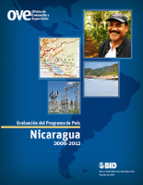Country Program Evaluation: Nicaragua (2008-2012)
Date
Nov 2012
The 2008-2012 Country Program Evaluation (CPE) concludes that the Bank's program was programmatically aligned with Government's National Plan for Human Development and addressed five areas essential for growth and poverty reduction. The one significant omission in the Bank's program from a development perspective was the lack of attention to governance an area identified as a priority for future strategies by the previous CPE. The Bank played a central role in financing the country's fiscal gap over the CPE period, reflecting increased country demand in the context of the global financial crisis. Nevertheless, time constraints limited the Bank's analytical efforts to identify important policy reforms in the first series of three programmatic policy-based loans, resulting in relatively weak policy content in those loans. Even with significant increases in the level of concessional resources allocated to Nicaragua and greater complexity in programming, the efficiency of program execution improved. In terms of developmental effectiveness, project-level results have generally been poorly documented. Furthermore, the Bank has at times overlooked the issue of recurrent cost financing for services initiated under investment loans, leading to the untimely suspension of programs and undermining the effectiveness of the initial investment. In light of CPE findings, OVE recommends that the Bank: (i) undertake further diagnostic and analytic work to delineate the Bank¿s potential role and value-added; (ii) continue to support improvements in the efficiency of public expenditure, including in the electricity sector; (iii) strengthen the measurement and reporting of results at the project level; (iv) identify potential sources of financing for the continued provision of services beyond project completion; and (v) consider allowing D-2 countries access to emergency lending facilities to meet fiscal needs in times of crisis.



